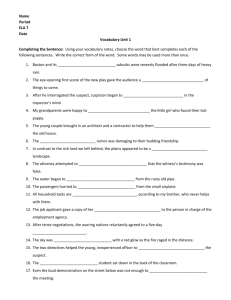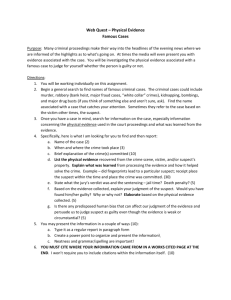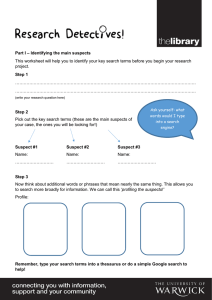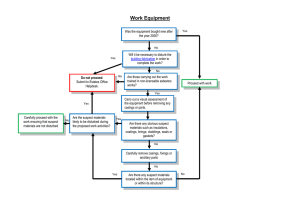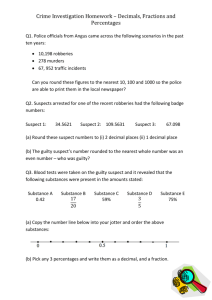Obtaining Blood for D.W.I. Prosecution
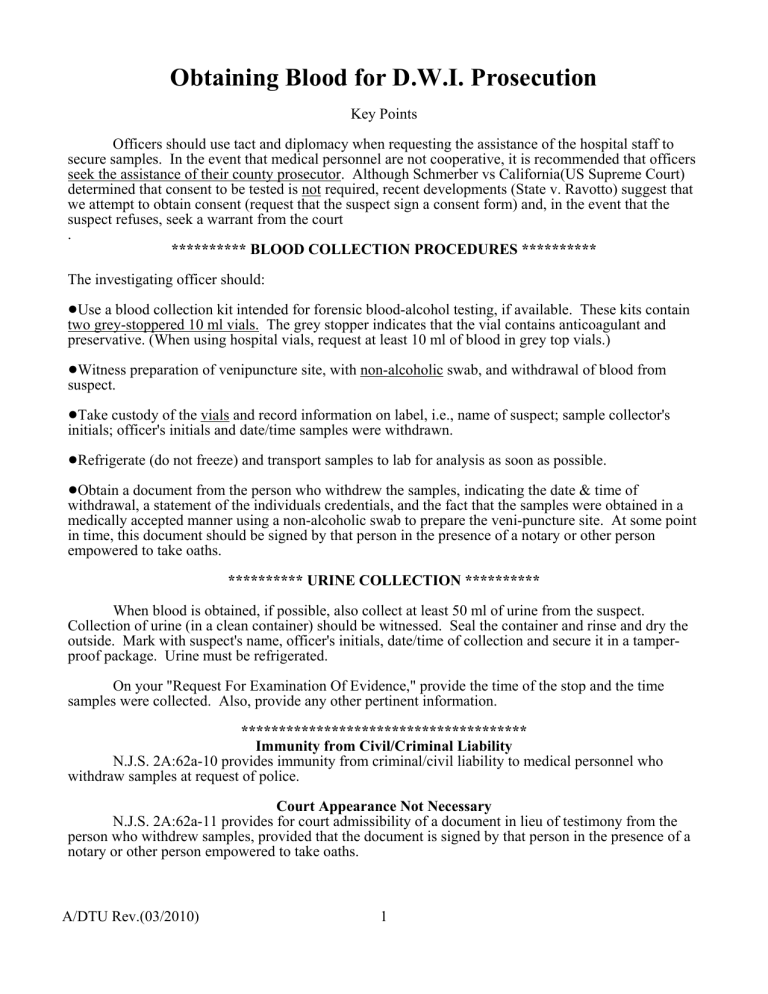
Obtaining Blood for D.W.I. Prosecution
Key Points
Officers should use tact and diplomacy when requesting the assistance of the hospital staff to secure samples. In the event that medical personnel are not cooperative, it is recommended that officers seek the assistance of their county prosecutor. Although Schmerber vs California(US Supreme Court) determined that consent to be tested is not required, recent developments (State v. Ravotto) suggest that we attempt to obtain consent (request that the suspect sign a consent form) and, in the event that the suspect refuses, seek a warrant from the court
.
********** BLOOD COLLECTION PROCEDURES **********
The investigating officer should:
!
Use a blood collection kit intended for forensic blood-alcohol testing, if available. These kits contain two grey-stoppered 10 ml vials. The grey stopper indicates that the vial contains anticoagulant and preservative. (When using hospital vials, request at least 10 ml of blood in grey top vials.)
!
Witness preparation of venipuncture site, with non-alcoholic swab, and withdrawal of blood from suspect.
!
Take custody of the vials and record information on label, i.e., name of suspect; sample collector's initials; officer's initials and date/time samples were withdrawn.
!
Refrigerate (do not freeze) and transport samples to lab for analysis as soon as possible.
!
Obtain a document from the person who withdrew the samples, indicating the date & time of withdrawal, a statement of the individuals credentials, and the fact that the samples were obtained in a medically accepted manner using a non-alcoholic swab to prepare the veni-puncture site. At some point in time, this document should be signed by that person in the presence of a notary or other person empowered to take oaths.
********** URINE COLLECTION **********
When blood is obtained, if possible, also collect at least 50 ml of urine from the suspect.
Collection of urine (in a clean container) should be witnessed. Seal the container and rinse and dry the outside. Mark with suspect's name, officer's initials, date/time of collection and secure it in a tamperproof package. Urine must be refrigerated.
On your "Request For Examination Of Evidence," provide the time of the stop and the time samples were collected. Also, provide any other pertinent information.
**************************************
Immunity from Civil/Criminal Liability
N.J.S. 2A:62a-10 provides immunity from criminal/civil liability to medical personnel who withdraw samples at request of police.
Court Appearance Not Necessary
N.J.S. 2A:62a-11 provides for court admissibility of a document in lieu of testimony from the person who withdrew samples, provided that the document is signed by that person in the presence of a notary or other person empowered to take oaths.
A/DTU Rev.(03/2010) 1
Case Law
CONSENT:
Schmerber vs California (US SUPREME COURT, 384 US 757 (1966))
- Blood can be taken and tested without consent over the objection of the suspect without violation of due process (under the 14th amendment) or his right against self-incrimination (under the
5th amendment).
- Blood is physical evidence and is non-testimonial in nature.
WHO CAN DRAW BLOOD:
State of New Jersey vs Russell McMaster (118 NJ A.D. 476 (1972))
- Anyone who is qualified can withdraw blood provided that it is accomplished in a medically acceptable manner.
PHYSICIAN-PATIENT PRIVILEGE (N.J.S.A. 2A:84A-22.2):
State of New Jersey vs Linda Schreiber - (NJ SUPREME COURT, 122 NJ 579 (1991))
- Physician-Patient privilege applies to criminal offenses, to civil matters, to disorderly persons offenses and to juvenile offenses... not to motor vehicle offenses.
USE OF FORCE TO OBTAIN BLOOD:
State of New Jersey vs David Horstmann (NJ App. Div. A-691-79 (1980))
- Necessary force can be used to obtain blood samples.
State of New Jersey vs Ravotto (169 NJ 227 (2001) Supreme Court)
- Raises issues relative to use of force to obtain blood without a warrant
2A:62A-10. Medical personnel and facilities involved in obtaining bodily substance specimens; immunity from civil or criminal liability
When acting in response to a request of a State, county, or municipal law enforcement officer, a county prosecutor or his assistant, the Attorney General or his deputy or a State or county medical examiner, any physician, nurse, or medical technician who withdraws or otherwise obtains, in a medically accepted manner, a specimen of breath ,blood, urine or other bodily substance and delivers it to the law enforcement officers specified herein shall be immune from civil or criminal liability for so acting, provided the skill and care exercised is that ordinarily required and exercised by others in the profession. The immunity from civil or criminal liability shall extend to the hospital or other medical facility on whose premises or under whose auspices the specimens are obtained, provided the skill, care and facilities provided are those ordinarily so provided by similar medical facilities.
L.1986, c. 189, § 1, eff. Dec. 17,1986.
2A:62A-11.
Specimens taken in medically acceptable manner; certificate; evidence
Any person taking a specimen pursuant to section 1 of this act (2A:62A-10), shall, upon request, furnish to any law enforcement agency a certificate stating that the specimen was taken pursuant to section 1 of this act and in a medically acceptable manner. The certificate shall be signed under oath before a notary public or other person empowered to take oaths and shall be admissible in any proceeding as evidence of the statements contained therein.
L.1986, c.189, § 2, eff. Dec. 17,1986
A/DTU Rev.(03/2010) 2

